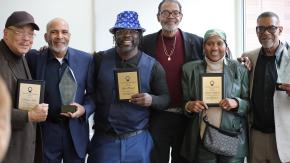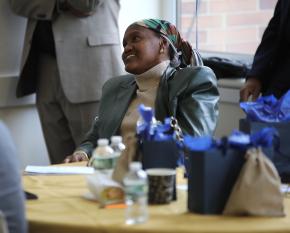
Reentry after incarceration can be a difficult journey, but there are people working to make sure returning citizens don’t have to go it alone.
More than 600,000 people return from prison each year in the United States, with millions more coming home from jail.
Reentry can be a difficult journey. After months, years, or even decades behind bars, many returning citizens face the challenges of finding housing, employment, health care, and other basic necessities with little support. Too often, those challenges are compounded by the barriers associated with a criminal record, which can keep people from accessing the very opportunities they need to succeed after incarceration.
To bring support to returning citizens and build connections between organizations who work in reentry, our Bronx Community Solutions team hosted a reentry forum and resource fair at Hostos Community College in the South Bronx. Bronx Community Solutions runs a Reentry Anonymous group twice a month to offer critical resources and a sense of community to formerly incarcerated people. They also work to prevent incarceration in the first place, connecting people who come into criminal court with community-based services as an alternative to jail and prison.
Nearly 20 service providers gathered in Hostos to offer people returning from incarceration help with housing, child care, legal needs, food insecurity, physical and mental health care, and more.
Two of those needs—housing and mental health care, with a focus on addressing widespread trauma—were at the center of our policy brief exploring reentry as a process of social integration. The brief grew out of a national convening on reentry we hosted in Washington, D.C., where stable, affordable housing and trauma-informed therapy stood out as fundamental priorities for those returning from prison or jail.
Anything that needs to get done that we can’t do ourselves, we can do it together.
After the resource fair, advocates and practitioners—many of them formerly incarcerated themselves—shared their own experiences with reentry and what it means to support others on that journey.
For keynote speaker Reverend Arthur Rose, really meeting the needs of people returning from incarceration takes collaboration from a wide range of groups and organizations that often work independently of each other. “I may not be able to get through to you, but maybe this other person can,” he said. “Anything that needs to get done that we can’t do ourselves, we can do it together.”
It also takes honesty—honesty about the larger issues, like systemic racism and disinvestment, that contribute to both mass incarceration and many of the challenges associated with reentry. “In prison, you’re a number,” said Reverend Rose. “And we have returning citizens coming home who get put on hold, who have to take a number all over again.”
Another panelist, Selina Fulford, shared her story as a formerly incarcerated advocate who went on to earn three Master’s degrees and become a special consultant for the City Department of Health and Mental Hygiene after returning from prison.

Selina Fulford.
“The reason I got so many degrees,” Fulford shared, “was because I was trying to overcome the stigma of being formerly incarcerated.” Today, she also advocates for incarcerated women around the world, bringing awareness to the growing rates of women in jails and prisons.
For many people returning from incarceration, the horizon of possibility seems all too narrow. Ian Manuel, a poet and activist who spent 18 consecutive years in solitary confinement after being incarcerated as a teenager, wanted others to know their greatest achievements were still ahead of them.
“Don’t limit yourself,” Manuel said. “That would be my advice.”
At the end of the event, the forum’s panelists were celebrated for their profound achievements in their journey as returning citizens. Two leaders of the Reentry Anonymous group—Cary Grant and Bronx Community Solutions’ Ramon Semorile—received awards in recognition of their dedicated service to others returning from incarceration.
Reentry is a pivotal moment in the criminal justice system and in people’s lives. Our Bronx Community Solutions team is working alongside many others to make sure that those navigating it have the support and resources they need to thrive.

